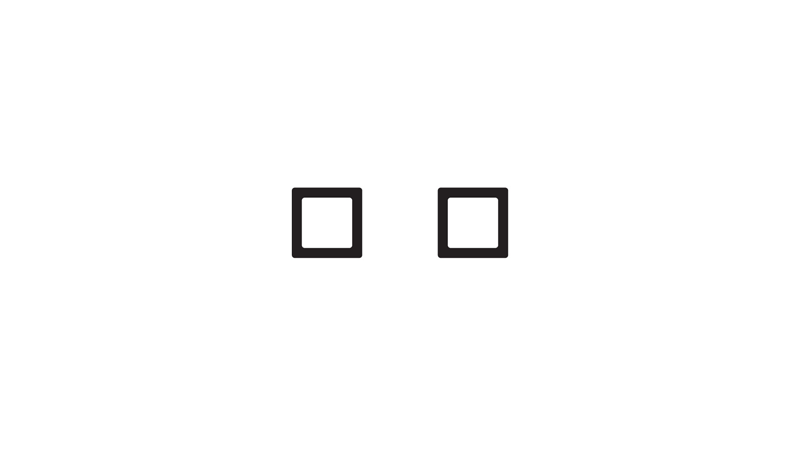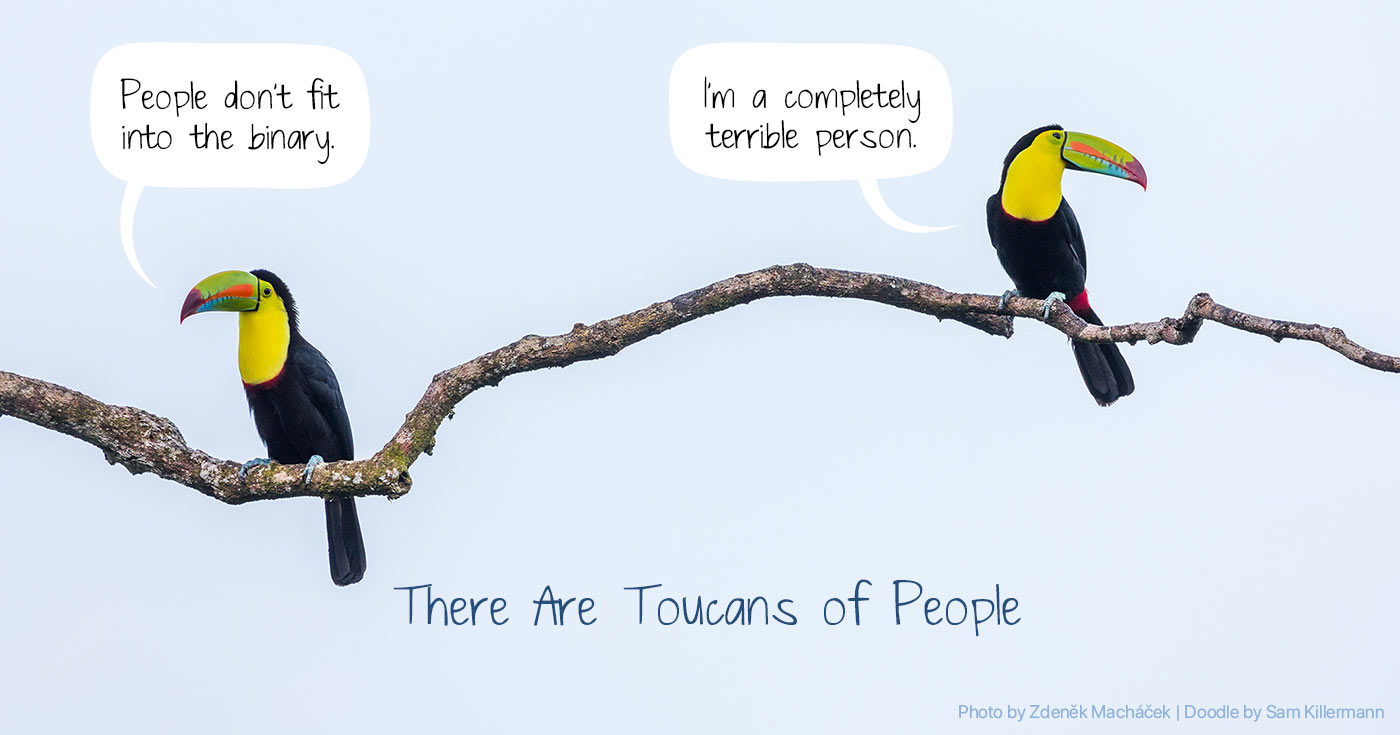I’ve always believed that one of our superpowers as gender/sexuality activists, and social justice people more broadly, is our ability to hold space for nuance. In the past few years, that belief has been crumbling. In part because of how much I’m seeing us replace one way of binary thinking for another.
For a long time, we’ve known that sexuality isn’t a binary thing. It’s not gay/straight, either/or. It’s often both/and, neither, or another option altogether. The Kinsey Scale often comes to mind here.
More recently, we’ve recognized the same thing about gender. We’ve addressed the complexities of gender, viewing it on a spectrum, or, better, on scales. And broken through the binary of woman/man. Just like sexuality, it’s not an either/or, but more of a both/and, neither, or another option altogether.
Now, it’s not entirely clear to me that everyone writing about binaries (e.g., the gender binary) is saying the same thing.
So allow me to be clear what I mean (and have always meant) by binary: two options. Two ways to be. Two categories. And that’s it. Only two.
A binary can be succinctly summed up by this (no words needed):

And while neither the gender or sexuality binary is without plenty of debate (from middle-of-the-road people to outright anti-social justice people), there’s a feeling of consensus amongst social justice people: It’ll be better for everyone if we move beyond these binary ways of thinking.
The truth that we’re pushing for here is the recognition that gender, sexuality, and other aspects of our personhood are complicated, nuanced, and more shades-of-gray (ahem) than black/white.
We argue that it’s important for everyone to recognize that truth because it results in the recognition, or visibility, of people made invisible by the previous discourse. We’re able to see people where they stand, for who they are, and allow them to show up.
A binary simply doesn’t create enough room for most of us to fit. People are more complicated than that. More diverse.
If we can’t recognize people, we can’t hear their voice. Can’t be made to care about their collective or individual suffering. Won’t be bothered to do anything about it.
Two binaries “smashed.” Destroyed. Demolished. Etc. other unnecessarily violent and hyperbolic descriptors.
Great!
But (uh oh) there’s a hitch.
The Binaries We’ve Come to Love
In all of our campaigning against binary thinking — our arguments for recognizing the complexity and nuance and gradations of experience that are intrinsic to the human experience — we seem to have lost the plot.
To accomplish our goal of convincing people that binaries are bad, we’ve created a bunch of new binaries. (At least, a lot of us who are parts of the fandom of social justice have)
Similar to the social justice power inverse, we haven’t moved beyond the harmful mechanism — in this case, binary thinking, or forcing people to reduce nuance and complexity into simple dualities — we’ve just swapped out the binaries and options you can choose from.
We’re maintaining and upholding the value of thinking in binary ways, as long as you confine yourself within the correct binaries.
Those binaries are bad. But I have some new ones that aren’t. Trust me.
For example, here’s a binary that gets reinforced constantly in conversations about gender, sexuality, and social justice:
Privileged Oppressed
A lot of people (almost non-hypothetically everyone) can’t check just one of those boxes. Most of us are both of those, depending on which aspect of us you’re talking about, or what situation we’re in.
But when people bring that up, what I just said — in workshops, online, or in other social justice education spaces — they’re met with another binary to either self-select into, or be shoved into:
Unquestioningly Supportive Oppressive
Have fun picking which of those boxes to check. It’s like when your parents gave you the “option” of putting on your shoes before the count of 3.
I’ve seen this happen more times than I can recount, and I’m guessing you have too. Someone raises their hand, offers a counterpoint or constructive criticism, and suddenly the mood of the space changes from education to trial. Witnessing this over and over is one of the things that led me to start writing about social justice dogma.
If you question a social justice narrative, or complicate things, or add nuance, you risk being lumped into the “oppressive” box, being seen as part of the problem. Oh, that’s another binary we love:
Part of the Solution Part of the Problem
We have so many new binaries that we’ve created, that we actively sort people into. New either/or ways of thinking, that tell us who is good, who we’re allowed to like, what ideas we should support, and how we’re allowed to show our support, and more. Each of those with a dichotomous opposite.
At the risk of boring you with example overload, I’ll just quickly blurt out a few more before I wrap this thing up.
Your feminism is either…
Intersectional Racist/Supremacist/Bigoted
You’re either an…
Ally Who Wants Cookies Good Ally (Who Doesn’t)
Based on your identities, choosing to speak is either…
Sharing Your Truth Taking Up Space
Based on community verdict, you’re either…
Okay (for now) Canceled
And ultimately, you’re either…
Woke Problematic
I could go on (and on, and on) with that list. You can probably think of a few binaries I haven’t listed.
I could also elaborate on each of them, and really dig into the unhelpfulness of that binary way of thinking (e.g., arguing that everyone — including your favs, your friends, and you — is problematic).
Instead, I’m going to end this more broadly, focusing on binary thinking itself.
So what?
At the risk of this article coming across as hypocrisy theatre, let me get to my point.
It’s a simple one, I think. And something that on its face feels obvious, but will nonetheless feel controversial to many:
We can’t undo the harms of one oversimplified binary by enacting another oversimplified binary.
Liberating everyone from the confines of one of two boxes, only to force them into one of two other boxes is not a path toward equity, or a truly just society.
And I’m not saying that we “can’t” do this because we have a moral imperative, or should take “the high road.” It’s not about this being hypocritical. It’s not that at all. I’m saying can’t do it because it’s not working. It won’t work.
Combatting dichotomous, rigid, reductive thinking with dichotomous, rigid, reductive thinking is not a winning strategy.
It works when you’re preaching to the converted, sure. You can wield it as a weapon of fear to keep your people from stepping out of line. “Keep believing this, in these specific ways, or we’ll cast you out.”
And weapon isn’t an overstatement. The threat of rejection, isolation, and alienation is the threat of physical pain. Kicking someone out of your community is tantamount to breaking their leg.
We’re not just in the business of preaching to the converted. We’re about changing, and opening, minds. Creating health where before there was suffering.
If we want people to recognize the diversity inherent in humanity — that shows up as spectrums of genders and sexualities — and the limitations of reducing all of that to two boxes into which we lump everyone, we have to recognize the diversity inherent in humanity. And stop lumping everyone into one of two boxes.
We need to embrace nuance. Tap into the magical power of “some.” Recognize the truth that almost none of this is absolute, either/or. The same goes for us: we live in the gray. Hiding from that isn’t helping anyone.
The tool of binary thinking isn’t capable of fixing the problem of binary thinking.
Or, to borrow the words of someone more brilliant than me:
“The master’s tools will never dismantle the master’s house. They may allow us temporarily to beat him at his own game, but they will never enable us to bring about genuine change.”
Are you going to disagree with Audre Lorde? Watch out, or you might land yourself in a box you don’t want to be in:
Disagreeing with Audre Lorde Not 100% Regretting A Foolish Mistake


